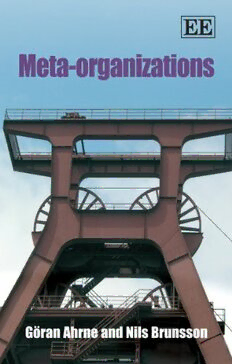
Meta-organizations PDF
200 Pages·2008·0.441 MB·English
Most books are stored in the elastic cloud where traffic is expensive. For this reason, we have a limit on daily download.
Preview Meta-organizations
Description:
A growing number of organizations are meta-organizations; rather than individuals they have other organizations as their members. This comprehensive book explains, in-depth, the unique way in which meta-organizations function, how they differ from organizations with individual membership, and how they are crucial agents in the process of globalization. G?¶ran Ahrne and Nils Brunsson combine the fields of organization theory and international relations in a new way. They portray a theory based on insights from organization studies that is also used to explain and understand international organizations. This theory creates new possibilities to analyze meta-organizations such as the EU and the UN and compare them to other meta-organizations such as national trade associations, sport federations and international non-governmental organizations. The authors point out striking similarities between all these organizations that have never been discovered before, including the conditions for membership, identity formation and decision-making.The book opens a whole new area for organizational research. It will be essential reading for researchers and postgraduate students interested in organization theory, globalization, politics and organizations, or international organizations.Contents: Preface; 1. Organized Organizations; 2. Many Meta-organizations; 3. Environment, Members, and Meta-organizations; 4. Creating and Sustaining Meta-organizations; 5. Similarity, Dissimilarity, and Identity Formation; 6. Conflicts and Decision-making Problems; 7. The Dynamics of Meta-organizations; 8. Meta-organizations and Individual-based Organizations; 9. Organized Globalisation; References; Index
See more
The list of books you might like
Most books are stored in the elastic cloud where traffic is expensive. For this reason, we have a limit on daily download.
